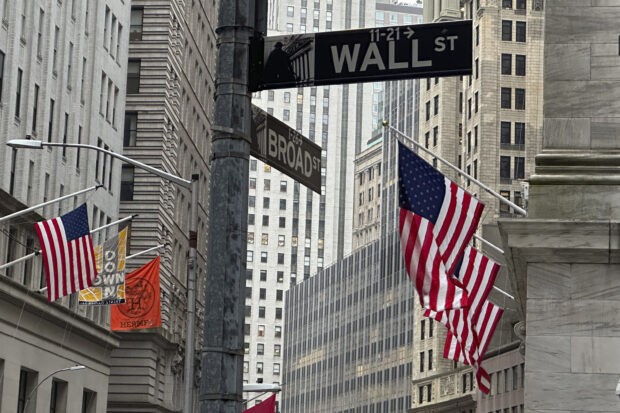
American flags hang from the front the New York Stock Exchange, right, on Thursday, April 11, 2024 in New York. Shares in Europe and Asia are mostly lower after U.S. stocks fell following another release of hotter than expected inflation data. (AP Photo/Peter Morgan)
NEW YORK — Jumps for Big Tech on Thursday helped U.S. stock indexes claw back much of their slide from the day before.
The S&P 500 rose 38.42 points, or 0.7 percent, to 5,199.06 and recovered most of its prior loss, caused by worries that interest rates may stay high for a while.
The Nasdaq composite charged up by 271.84, or 1.7 percent, to a record 16,442.20. The Dow Jones Industrial Average, which has less of an emphasis on tech, was the laggard. It slipped by 2.43 points, or less than 0.1 percent, to 38,459.08.
Apple was the strongest force pushing the market upward. It climbed 4.3 percent to trim its loss for the year so far. Nvidia was close behind, as it keeps riding a frenzy around artificial intelligence technology. The chip company rose 4.1 percent to take its gain for the year to 83 percent. Amazon added 1.7 percent and set a record after topping its prior high set in 2021.
It’s a return to last year’s form when a handful of Big Tech stocks was responsible for the majority of the market’s gains. This year, the gains had been spreading out. That is until worries about stubbornly high inflation sent a chill through financial markets.
READ: Wall Street rallies near record heights as Big Tech stocks recover
In the bond market, which has been driving much of Wall Street’s action, Treasury yields held relatively steady following a mixed batch of data on inflation and the U.S. economy.
Fed interest rate cut bets
When or whether the Federal Reserve will deliver the cuts to interest rates that traders are craving has been one of the main questions dominating Wall Street. After coming into the year forecasting at least six cuts to rates, traders have since drastically scaled back their expectations.
A string of hotter – than – expected -reports on inflation and the economy has raised fears that last year’s progress on inflation has stalled. Many traders are now expecting just two cuts in 2024, with some discussing the possibility of zero.
READ: US consumer inflation accelerated in March, dampening rate cut hopes
A report on Thursday morning showed inflation at the wholesale level was a touch lower last month than economists expected. That’s encouraging, but the data also showed underlying trends for inflation were closer to forecasts or just above.
Those numbers strip out the effects of fuel and some other prices that are notoriously jumpy, and economists say they can give a better idea of where inflation is heading.
The update doesn’t offset Wednesday’s disappointingly high report on inflation at the U.S. consumer level, “but it may ease investor nerves, at least in the short term,” said Chris Larkin, managing director of trading and investing at E-Trade from Morgan Stanley.
A separate report said fewer U.S. workers applied for unemployment benefits last week. It’s the latest signal that the job market remains remarkably solid despite high interest rates.
The Federal Reserve has been holding its main interest rate at the highest level since 2001 in hopes of pushing down enough on the economy and investment prices to get high inflation under control. The fear is that rates held too high for too long because of stubbornly high inflation can cause a recession.
Some investors are now warning that any cuts to rates by the Fed could be seen as a red flag more than anything, and may happen only if the economy and job market are weakening enough to require an extra lift.
Earnings reporting season
All this is coming at a time when critics had already been calling the U.S. stock market too expensive following its leap of more than 20% since Halloween. For stock prices to look more reasonable, without requiring sharp drops, either interest rates would need to fall or corporate profits would need to strengthen.
Earnings reporting season is just underway, as companies tell investors how much they earned during the first three months of the year.
Rent the Runway more than doubled after reporting slightly better revenue for its latest quarter than expected. The company, which allows customers to rent designer clothes, also said it expects to break even on a cash-flow basis this upcoming fiscal year. Its stock soared 161.9 percent.
Alpine Immune Sciences soared 36.9 percent after Vertex Pharmaceuticals agreed to buy the biotechnology company for $4.9 billion in cash. Vertex added 0.7 percent.
CarMax dropped to one of the largest losses in the S&P 500 after it reported weaker profit for its latest quarter than analysts expected. Higher interest rates on car loans are making the business tougher, along with tightened lending standards and low consumer confidence. Its stock skidded 9.2 percent.
In the bond market, the yield on the 10-year Treasury rose to 4.57 percent from 4.55 percent late Wednesday. The two-year yield, which more closely tracks expectations for Fed action, fell to 4.94 percent from 4.97 percent.
In stock markets abroad, indexes fell modestly across Europe after the European Central Bank held its main interest rate steady.
Stocks were mixed in Asia, where South Korea’s Kospi edged up by 0.1 percent after the ruling conservative party suffered a crushing defeat in a parliamentary election.

